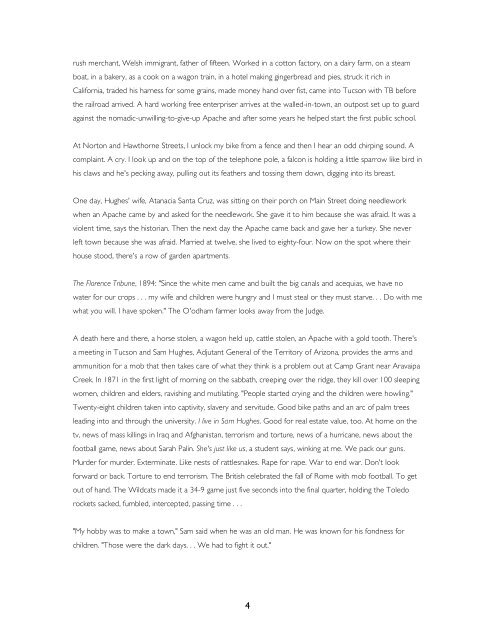THE CONTENT OF HISTORY WILL BE POETRY Barbara Henning
THE CONTENT OF HISTORY WILL BE POETRY Barbara Henning
THE CONTENT OF HISTORY WILL BE POETRY Barbara Henning
Create successful ePaper yourself
Turn your PDF publications into a flip-book with our unique Google optimized e-Paper software.
ush merchant, Welsh immigrant, father of fifteen. Worked in a cotton factory, on a dairy farm, on a steam<br />
boat, in a bakery, as a cook on a wagon train, in a hotel making gingerbread and pies, struck it rich in<br />
California, traded his harness for some grains, made money hand over fist, came into Tucson with TB before<br />
the railroad arrived. A hard working free enterpriser arrives at the walled-in-town, an outpost set up to guard<br />
against the nomadic-unwilling-to-give-up Apache and after some years he helped start the first public school.<br />
At Norton and Hawthorne Streets, I unlock my bike from a fence and then I hear an odd chirping sound. A<br />
complaint. A cry. I look up and on the top of the telephone pole, a falcon is holding a little sparrow like bird in<br />
his claws and he's pecking away, pulling out its feathers and tossing them down, digging into its breast.<br />
One day, Hughes' wife, Atanacia Santa Cruz, was sitting on their porch on Main Street doing needlework<br />
when an Apache came by and asked for the needlework. She gave it to him because she was afraid. It was a<br />
violent time, says the historian. Then the next day the Apache came back and gave her a turkey. She never<br />
left town because she was afraid. Married at twelve, she lived to eighty-four. Now on the spot where their<br />
house stood, there's a row of garden apartments.<br />
The Florence Tribune, 1894: "Since the white men came and built the big canals and acequias, we have no<br />
water for our crops . . . my wife and children were hungry and I must steal or they must starve. . . Do with me<br />
what you will. I have spoken." The O'odham farmer looks away from the Judge.<br />
A death here and there, a horse stolen, a wagon held up, cattle stolen, an Apache with a gold tooth. There's<br />
a meeting in Tucson and Sam Hughes, Adjutant General of the Territory of Arizona, provides the arms and<br />
ammunition for a mob that then takes care of what they think is a problem out at Camp Grant near Aravaipa<br />
Creek. In 1871 in the first light of morning on the sabbath, creeping over the ridge, they kill over 100 sleeping<br />
women, children and elders, ravishing and mutilating. "People started crying and the children were howling."<br />
Twenty-eight children taken into captivity, slavery and servitude. Good bike paths and an arc of palm trees<br />
leading into and through the university. I live in Sam Hughes. Good for real estate value, too. At home on the<br />
tv, news of mass killings in Iraq and Afghanistan, terrorism and torture, news of a hurricane, news about the<br />
football game, news about Sarah Palin. She's just like us, a student says, winking at me. We pack our guns.<br />
Murder for murder. Exterminate. Like nests of rattlesnakes. Rape for rape. War to end war. Don't look<br />
forward or back. Torture to end terrorism. The British celebrated the fall of Rome with mob football. To get<br />
out of hand. The Wildcats made it a 34-9 game just five seconds into the final quarter, holding the Toledo<br />
rockets sacked, fumbled, intercepted, passing time . . .<br />
"My hobby was to make a town," Sam said when he was an old man. He was known for his fondness for<br />
children. "Those were the dark days. . . We had to fight it out."<br />
4


